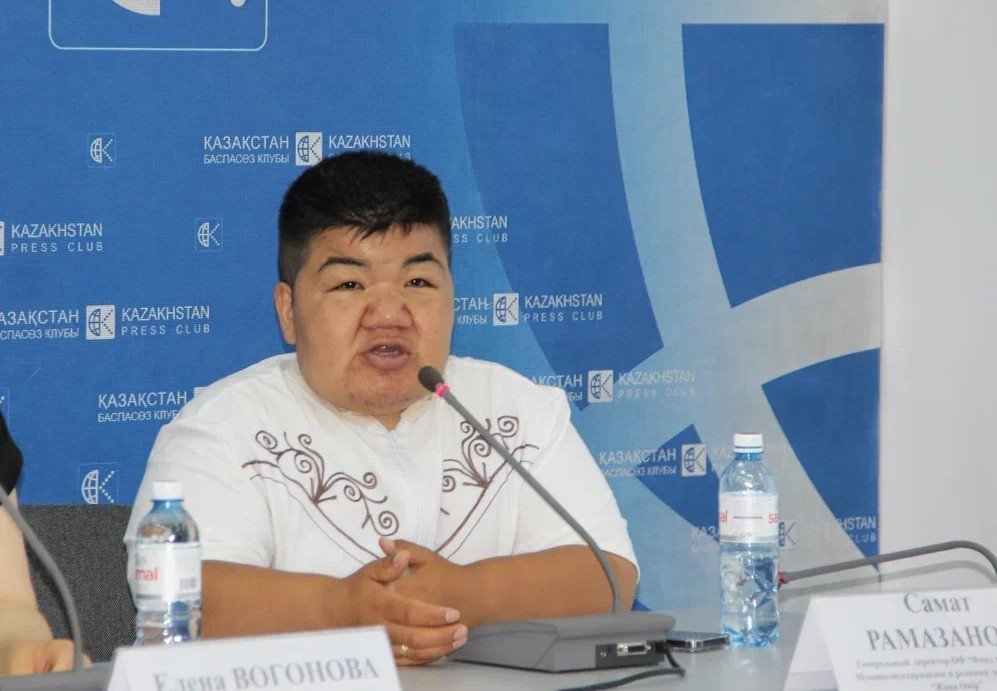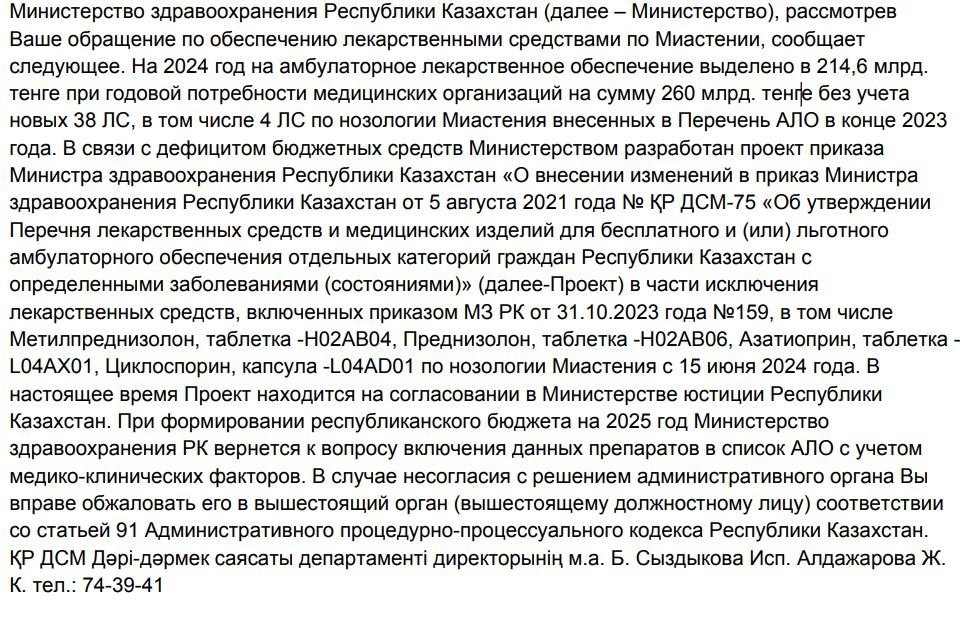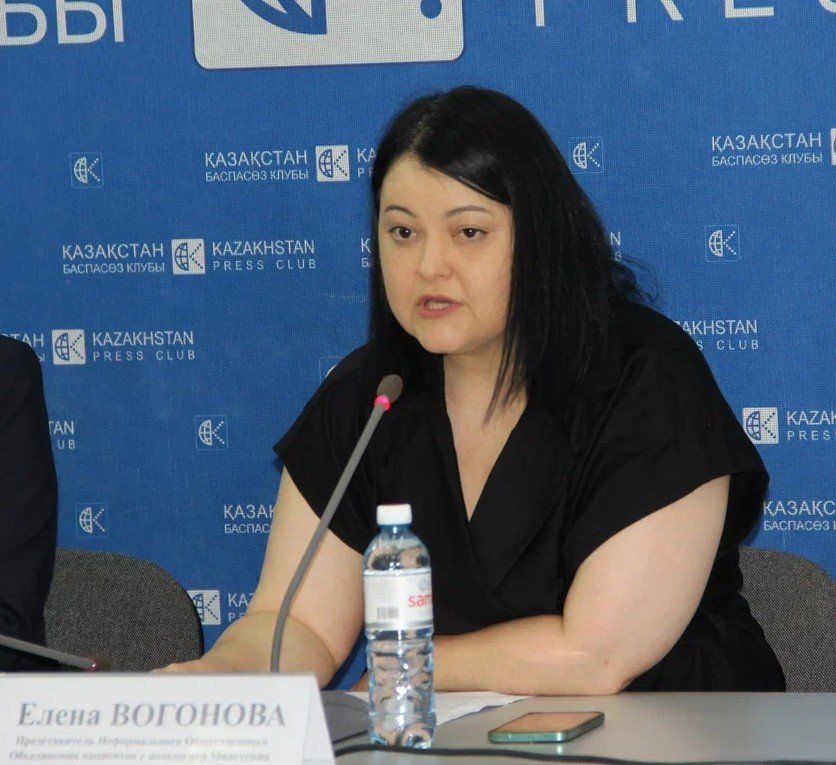Patients with Rare Conditions Speak out About Medicine Provisions
 Image created using AI
Image created using AI
Changes in medicine provisions proposed by the Ministry of Health recently caused quite a stir. Cancer patients and patients with rare conditions have expressed their concerns. The Ministry of Health seemed to be able to explain that oncology patients' treatment was not at risk. People with rare conditions, however, have a more complicated situation. Patients with such diagnoses still distrust what the Ministry of Health says. Orda.kz has looked into the matter.
Rumors
For the first time, representatives of patients with rare conditions drew attention to problems with financing in the winter of this year. They held a press conference where they described their concerns. They stated that medicines for patients with rare conditions in Kazakhstan are purchased from three sources: the republican budget, the local budget, and the Kazakhstan Khalkyna Charitable Foundation. It is also planned to expand financing from private foundations gradually.
People with rare conditions have concerns regarding this matter. Information that began to spread on the Internet caused further alarm: some rare condition classifications would supposedly soon be under the supervision of the foundations.
To be honest, I haven’t been able to sleep properly for the last one and a half to two months. I have mucopolysaccharidosis. There are 93 patients like me in Kazakhstan. Every week we receive enzyme replacement therapy, only with the help of which we can lead a fulfilling life. And most importantly, you cannot skip taking medications. But the cost of medications for such therapy is very high - more than 300 million tenge per year per person. And if we are transferred to a public fund, then we fear that there simply won’t be enough money for us,said Samat Ramazanov, general director of the fund for patients with mucopolysaccharidosis and rare conditions “Jana Omir”.

Samat said this at a press conference at the Kazakhstan Press Club on June 11. The night before, “Kazakhstan Khalkyn” published information regarding transferring the additional classifications to their supervision. It says that they provide 18 medicines for 13 classifications and adds:
At the moment, the fund for 2024 and 2025 is not considering and does not plan to consider the matter of expanding the list of medicines purchased using the financial resources of the fund.
In turn, Minister of Health Akmaral Alnazarova, answering an Orda journalist's question, reassured that there would be no decrease in funding for patients with rare conditions in 2024–2025. Meanwhile, the three financial sources will remain unchanged, and the amounts will not face reduction. In Kazakhstan, they will also create a register of patients with rare conditions for 66 classifications.
Incidentally, patients have also spoken out about its absence. They, however, find the minister’s words unconvincing, providing a specific example.
Budget Savings
This example is the case of Almaty resident Elena Vogonova and her child. But it extends to approximately 3,000 people with myasthenia gravis. In the spring of this year, she reached out to the Ministry of Health to request free medicines for treatment. She received the following response from the ministry:

Direct translation:
The Ministry of Health of the Republic of Kazakhstan (hereinafter - the Ministry), having considered your application for the provision of medicines for Myasthenia gravis, informs the following. For 2024, 214.6 billion tenge has been allocated for outpatient drug provision with an annual demand of medical organizations in the amount of 260 billion tenge, excluding new 38 medicines, including 4 medicines for the classification of Myasthenia gravis included in the List of ODP at the end of 2023. Due to the budget deficit, the Ministry has developed a draft order of the Minister of Health of the Republic of Kazakhstan "On Amendments to the Order of the Minister of Health of the Republic of Kazakhstan dated August 5, 2021 No. KR DSM-75 "On approval of the List of medicines and medical devices for free and (or) preferential outpatient care for certain categories of citizens of the Republic of Kazakhstan with certain illnesses (conditions)" (hereinafter referred to as the Project) regarding the exclusion of medicines included in the Order of the Ministry of Health of the Republic of Kazakhstan dated 10/31/2023 No. 159, including Methylprednisolone, tablet -H02AB04, Prednisolone, tablet -H02AB06, Azathioprine, tablet L04AX01, Cyclosporine, capsule -L04AD01 for the nosology of Myasthenia gravis from June 15, 2024. The Project is currently being approved by the Ministry of Justice of the Republic of Kazakhstan. When forming the republican budget for 2025, the Ministry of Health of the Republic of Kazakhstan will return to the matter of including these drugs in the OPD list, taking into account medical and clinical factors. In case of disagreement with the decision of the administrative body, you have the right to appeal it to a higher authority (higher official) in accordance with Article 91 of the Administrative Procedural Code of the Republic of Kazakhstan. KR DSM Dari-darmek sayasaty department directoryn M.A. B. Syzdykova Sp. Aldazharova Zh. K. tel.: 74-39-41 -
Myasthenia gravis is indeed included in the list of rare condition classifications; it is listed as 48.
As Elena Vogonova says, medications for patients with myasthenia gravis are inexpensive for the state. But, for the patients themselves, it is relatively unaffordable. Many of them have disabilities.
And patients with other conditions receive the same medicines free of charge. For example, with asthma. But for some reason, the Ministry of Health decided to save money on myasthenia gravis, Elena said.

The chairperson of the Association for Assistance to Patients with Rare Conditions in the Republic of Kazakhstan, Bakhyt Baygaliyeva, provided Orda.kz with a letter from the National Scientific Center for Health Development named after Salidat Kairbekova. It talks about draft proposals to limit government funding for medications for rare conditions to three GDP per person. This is about 15 million tenge.
If this is indeed planned, it will not only complicate the lives of such patients but will put their lives at risk. Most medications for rare conditions cost millions of tenge. For example, the mother of a child with hemophilia, Lyudmila Shigabutdinova, gave the following figures:
My son, to lead a relatively fulfilling life, needs 209 million a year for preventive medications. If he does not take them, he will either lie down or sit in a wheelchair. But the question is: is it cheaper for the government if such patients stay in hospitals? says the woman.
According to Bakhyt Baygaliyeva, many patients with rare conditions in Kazakhstan have not received the necessary medications for years. This concerns those who count on local provisions.
If the local budget does not have the funds, then patients are turned away, Baygalieva says.
According to the association chairperson and patients, the system of providing medicines to patients with rare conditions in Kazakhstan must be changed entirely.
What will happen if nothing changes? We will die. Because if a person with myasthenia could somehow provide themselves with medications - they would ask their relatives, open a fundraiser on the Internet - then a patient with hemophilia or spinal muscular atrophy has no chance, says Elena Vogonova.
Bakhyt Baygaliyeva has proposed creating a single state fund to provide medicines for all rare conditions as an alternative to purchasing them from three sources.
Baigaliyeva used the Russian Circle of Goodness Foundation as an example. However, it provides medications for only 14 rare conditions out of 85 included in the Russian “List of severe life-threatening and chronic diseases, including rare conditions.” The Russian Ministry of Health provides for the remaining.
Original Author: Igor Ulitin
DISCLAIMER: This is a translated piece. The text has been modified, the content is the same. Please refer to the original piece published on 11/06/24 for accuracy.
Latest news
- Oil Smuggling Trial Begins in Aqtau Over Seized Tanker
- Armenian Foreign Ministry Open to Outsourcing Transport Corridor Oversight
- A Second Kazakhstan-Born Individual Convicted of Treason in Russia This Month
- National Fund Council: Toqayev Receives Tie-Breaking Vote Power
- Kazakhstani Caught With Fake Passport in Bulgaria Fears Extradition
- Rubio and Lavrov Hold Talks at ASEAN Summit Amid Escalation in Ukraine
- Asset Recovery: Price on De Beers Earrings Cut by 23 Million Tenge
- Pashinyan and Aliyev Discuss Normalization Efforts in Abu Dhabi
- What Will Be Considered Stalking? The Ministry of Justice Explains
- Kazakhstan Prepared to Build Karachaganak Gas Plant With Alternative Contractor if Needed
- Former Russian Orthodox Priest Launches Petition for Constantinople Church Presence in Kazakhstan
- Asset Recovery and Management Company Launches New Auction for Land in Nazarbayev’s Hometown
- Olzhas Bektenov Discusses Digital Innovation and Travel Safety with Yandex Qazaqstan
- Man Detained over Attempted Arson at House of Ministries Entrance
- Producer Says Zemfira Concert Canceled Due to Poor Planning
- Kazakhstan's Energy Minister Comments on Russia–China Gas Pipeline via Kazakhstan
- UN Working Group Says Gulnara Karimova Was Arbitrarily Detained, Uzbekistan Responds
- Perizat Kairat Claims Abuse in Detention
- U.S. Senate Considers Julie Stufft for Ambassador to Kazakhstan
- Leviathan vs. Orda: Gulnara Bazhkenova Speaks Out on Efforts to Seize Her Media and Threats to Her Life

